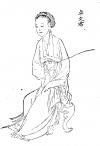Biography
Sima Xiangru 司马相如, also known as Ssu-ma Hsiang-ju 司馬相如 (179–127 BC) was a Chinese poet, musician, and author of the Western Han Dynasty (206 BCE – 9 CE). Sima's importance in Classical Chinese poetry consists both in his surviving works, several of which are especially famous, but also in his contribution to innovation in form and style. His poetry includes his invention or at least development of the fu form, applying new metrical rhythms to the lines of poetry, which he mixed with lines of prose, and provided with several of what would in ensuing centuries become among a group of common set topics for this genre. He was also versatile enough to write in the Chu Ci-style, while it was enjoying a brief renaissance, and he also wrote lyrics in what would become known as the yuefu formal style. Musically, Sima Xiangru is known for mastery of the guqin.
Sima Xiangru's life is a topic of biographical interest, and is featured in what enthusiasts like to refer to as the Records of the Grand Historian, but more prosaically is called the Shiji. Much is known about Sima Xiangru through Sima Qian's biography of him, in Shij ji 117. Sima Xiangru not only lived the good life as a member of two royal courts at different times of his life, but also experienced periods of financial and political difficulty: once he was disappointed in love, being forbidden marriage to the daughter of a wealthy man, but then eloped with his lover, in a famous scandal, where the couple supported themselves by opening and running a small tavern.






